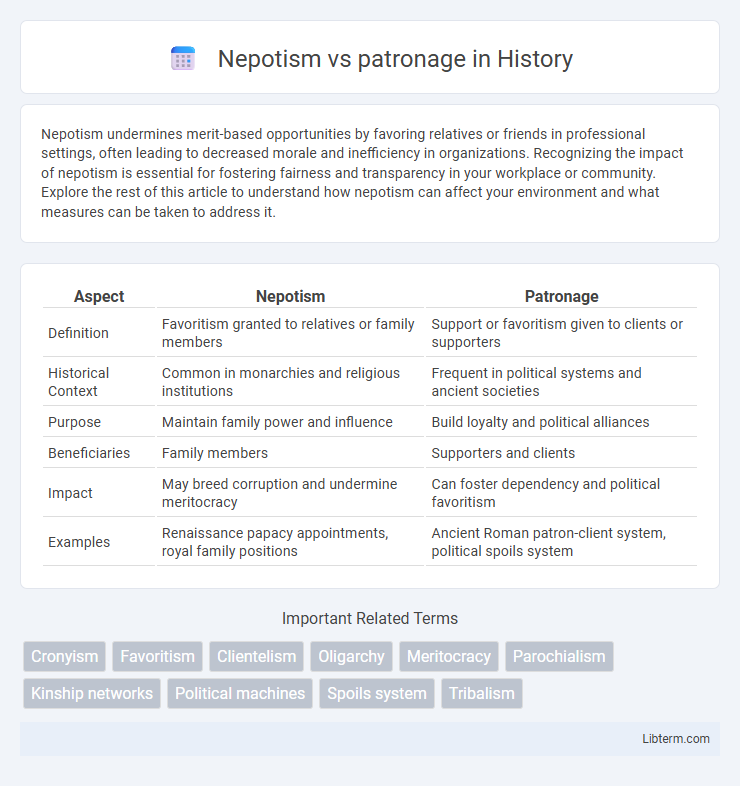Nepotism undermines merit-based opportunities by favoring relatives or friends in professional settings, often leading to decreased morale and inefficiency in organizations. Recognizing the impact of nepotism is essential for fostering fairness and transparency in your workplace or community. Explore the rest of this article to understand how nepotism can affect your environment and what measures can be taken to address it.
Table of Comparison
| Aspect | Nepotism | Patronage |
|---|---|---|
| Definition | Favoritism granted to relatives or family members | Support or favoritism given to clients or supporters |
| Historical Context | Common in monarchies and religious institutions | Frequent in political systems and ancient societies |
| Purpose | Maintain family power and influence | Build loyalty and political alliances |
| Beneficiaries | Family members | Supporters and clients |
| Impact | May breed corruption and undermine meritocracy | Can foster dependency and political favoritism |
| Examples | Renaissance papacy appointments, royal family positions | Ancient Roman patron-client system, political spoils system |
Understanding Nepotism: Definition and Origins
Nepotism refers to the practice of favoring relatives or close friends by granting them jobs or advantages, often disregarding merit or qualifications. The term originates from the Latin word "nepos," meaning nephew, historically linked to the preferential treatment seen in the Catholic Church. Understanding nepotism involves recognizing its roots in power dynamics and its impact on fairness and organizational efficiency.
Patronage Explained: Meaning and Historical Context
Patronage refers to the practice of granting favors, jobs, or advantages to individuals or groups in exchange for political support, often rooted in historical systems of power and influence. This system has shaped political structures since ancient times, exemplified by the Roman Empire's use of patron-client relationships to maintain loyalty and order. Patronage differs from nepotism by emphasizing broader political alliances rather than favoritism limited to family members.
Key Differences Between Nepotism and Patronage
Nepotism involves favoritism granted to relatives or family members in employment or political appointments, prioritizing kinship ties over merit. Patronage refers to the support, promotion, or hiring of individuals based on loyalty, political connections, or reciprocal relationships rather than qualifications. The key difference lies in nepotism's emphasis on familial relationships, whereas patronage is driven by allegiance and political alliances.
The Role of Family Ties in Nepotism
Family ties play a central role in nepotism, where favoritism is shown to relatives regardless of merit or qualifications, often leading to unfair advantages in employment and promotions. This practice undermines organizational efficiency and fosters resentment among employees who are overlooked despite their capabilities. Unlike patronage, which distributes benefits based on political loyalty or support, nepotism prioritizes blood relations, entrenching power within families and limiting diversity in leadership.
Patronage Systems in Politics and Business
Patronage systems in politics and business involve the allocation of resources, positions, or favors based on loyalty and support rather than merit, often strengthening networks of influence and control. This practice can lead to entrenched power structures where political leaders or business owners distribute opportunities to trusted allies to maintain allegiance and authority. Unlike nepotism, which centers on favoritism toward family members, patronage extends broadly to political supporters, clients, or business partners, shaping decision-making processes and organizational dynamics.
Impacts of Nepotism on Organizational Culture
Nepotism undermines meritocracy, leading to decreased employee morale and trust within an organization. It fosters a culture of favoritism where performance and qualifications are often overlooked, resulting in reduced productivity and innovation. Such practices create divisions among staff, increase turnover rates, and ultimately weaken the overall organizational effectiveness.
Patronage Networks: Loyalty and Influence
Patronage networks operate through reciprocal loyalty and influence, where patrons provide resources and opportunities in exchange for support and allegiance from clients. These networks reinforce social bonds and power structures by embedding favoritism within political and organizational systems. Patronage influences decision-making processes, shaping the distribution of key positions and access to benefits based on loyalty rather than merit.
Legal and Ethical Perspectives on Nepotism and Patronage
Nepotism involves favoring relatives in employment or positions, often raising legal concerns under anti-discrimination laws and ethical standards promoting fairness and meritocracy. Patronage, the practice of granting jobs or favors based on political support, may comply with legal frameworks but often faces ethical scrutiny for undermining equal opportunity and institutional integrity. Both practices challenge transparency and accountability in governance, prompting calls for stricter regulations and ethical guidelines to prevent abuse of power.
Combating Nepotism and Patronage: Best Practices
Combating nepotism and patronage requires implementing transparent hiring processes, such as merit-based evaluations and independent oversight committees, to ensure fairness and equal opportunity. Establishing clear anti-nepotism policies and regularly auditing organizational practices can reduce favoritism and increase accountability. Encouraging whistleblower protections and promoting a culture of ethical behavior further supports the fight against these unethical practices.
Case Studies: Real-World Examples of Nepotism vs Patronage
In the Philippines, the Marcos family illustrates nepotism by maintaining political power across generations through familial appointments, while the political patronage system in India, like in the case of the Gandhi family, showcases leaders rewarding supporters with government positions and contracts. Studies on South Africa reveal that nepotism often leads to inefficiencies in public services, whereas patronage networks contribute to entrenched corruption, as seen in the appointment of officials based on loyalty rather than merit. Brazil's political history demonstrates a blend of both, where family ties and patronage coexist, complicating efforts to promote transparency and accountability in governance.
Nepotism Infographic

 libterm.com
libterm.com